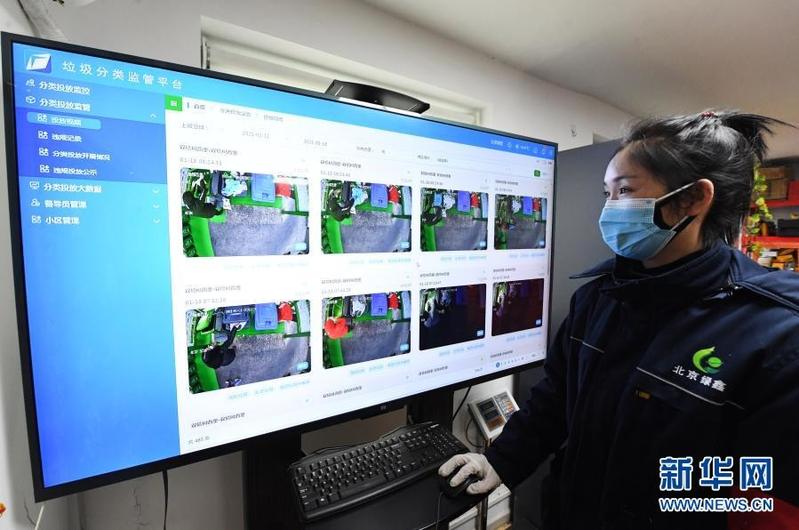 In this undated photo, a staff member of a community garbage-sorting management center in Beijing learns about information via an intelligent system. (REN CHAO / XINHUA)
In this undated photo, a staff member of a community garbage-sorting management center in Beijing learns about information via an intelligent system. (REN CHAO / XINHUA)
Progress was made in Beijing's management of household waste during the 13th Five-Year Plan period (2016-20), with the introduction of mandatory garbage sorting and increased levels of recycling.
Zhang Yan, deputy director and spokesman of the Beijing Commission of Urban Management, said Beijing residents' awareness of and participation in garbage sorting have both increased significantly.
As of May 2020, Beijing residents have been required to sort their household waste into the four categories of kitchen, recyclable, hazardous and other waste
As of May 2020, Beijing residents have been required to sort their household waste into the four categories of kitchen, recyclable, hazardous and other waste.
Over the past five years, the amount of food waste that has been separated from other garbage has risen from 309 metric tons per day to 4,248 tons. If food waste isn't separated and instead goes to a landfill, it rots and produces methane-a powerful greenhouse gas. When food waste is separated it can be ground up to produce water, carbon dioxide and organic solids that can be refined into fertilizer.
ALSO READ: Compulsory garbage sorting begins in capital
The recycling rate of domestic garbage has risen to more than 35 percent, according to the local government.
The city has designated 366 demonstration communities and villages for garbage sorting. Among them, Fuquan Garden community in Changping district has achieved more than 90 percent accuracy in its sorting.
Over the past five years, Beijing has added 20 waste disposal facilities, bringing the city's total to 46, with a total processing capacity of 33,800 tons per day, Zhang said.
READ MORE: Treatment of trash improved in Beijing
For construction waste, the city has 108 resource disposal facilities in operation.
Continuing the green theme, more than 80 percent of the city's sanitation vehicles under 4.5 tons run on new energy.
Looking ahead, the city's goal is that by May the accuracy rate of voluntary garbage sorting will reach 85 percent, the separation rate of household kitchen waste will remain at around 18 percent and the recycling rate of household waste will stand at more than 35 percent.
To further reduce food waste, restaurants are being urged to provide smaller portions and to advise customers to order in moderation.


